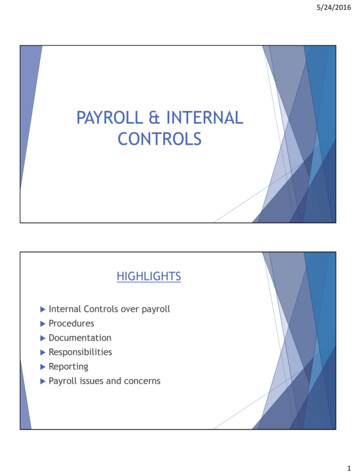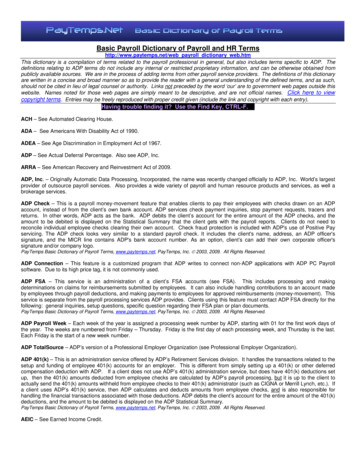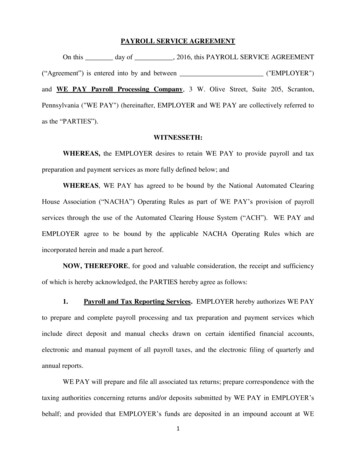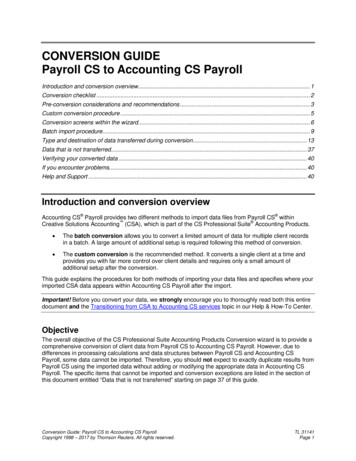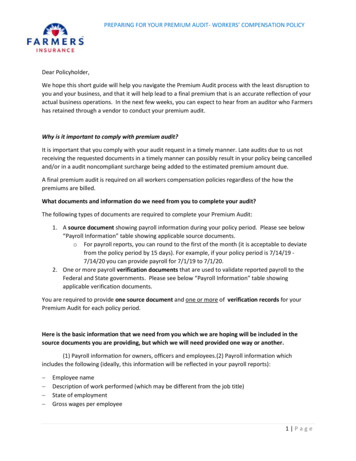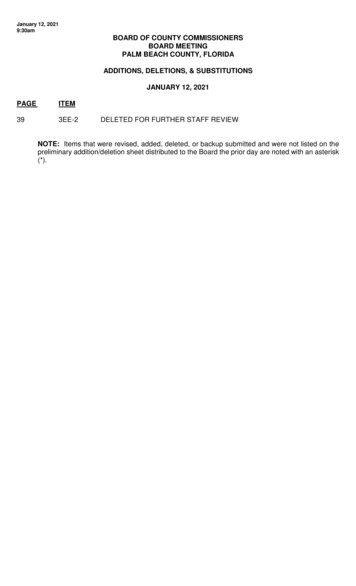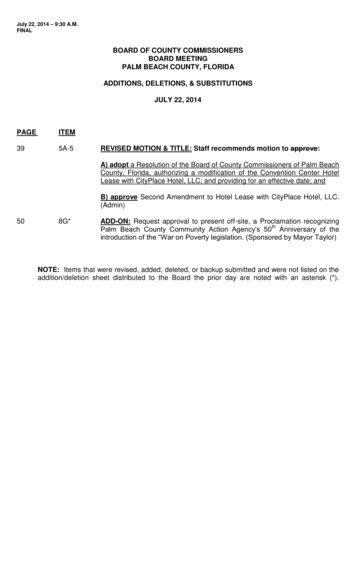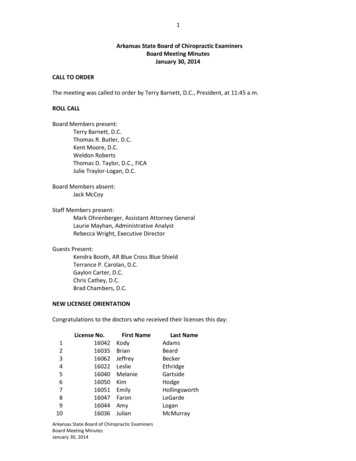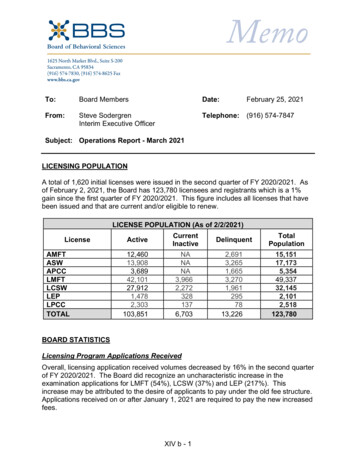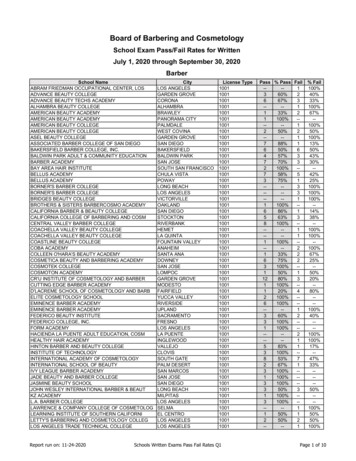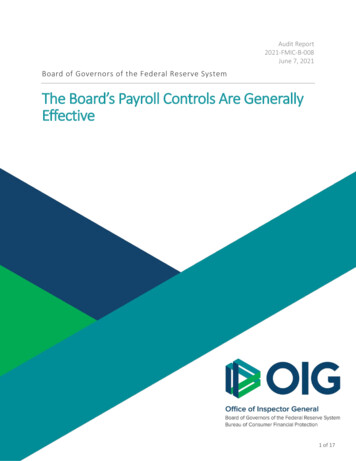
Transcription
Audit Report2021-FMIC-B-008June 7, 2021Board of Governors of the Federal Reserve SystemThe Board’s Payroll Controls Are GenerallyEffective2021-FMIC-B-0081 of 17
Executive Summary, 2021-FMIC-B-008, June 7, 2021The Board’s Payroll Controls Are Generally EffectiveFindingPurposeThe Board of Governors of the Federal Reserve System’spayroll controls are generally effective in ensuringcompliance with applicable laws, regulations, policies, andprocedures. We used data analytics to identify potentiallyunusual transactions and to test categories such as premiumpay, salary adjustments, tax withholdings, and payrolldeductions and additions.We conducted this audit to assess theeffectiveness of certain payroll internal controlsdesigned to ensure compliance with applicablelaws, regulations, policies, and procedures. Thescope of our audit covered January 1, 2019,through March 31, 2020; during this time period,Payroll processed 498.5 million in payments to3,112 Board employees.Our follow-up activities identified one instance in which theBoard did not comply with its compensation policy. In thatinstance, an employee’s base salary exceeded the grade-levelsalary maximum for 5 months. Implementing an additionalpayroll control to detect instances of employee payexceeding grade-level maximums can help the Board toensure that it compensates its employees in accordance withits internal policies.BackgroundRecommendationsOur report does not contain any recommendations. Afterbecoming aware of our finding, Payroll implemented acontrol to validate the pay information it uses to process thebiweekly payroll. We observed the execution of the controland found it to be effective. In response to our draft report,the chief financial officer states that the Division of FinancialManagement is pleased with our audit finding and that itremains committed to continuing an effective controlenvironment.2021-FMIC-B-008The Federal Reserve Act grants the Board broadauthority over employment matters, includingemployee compensation. Under this authority, theBoard has designed and implemented its owncompensation and benefits programs. Althoughthe Board is not subject to many federal personnelstatutes and regulations, it voluntarily complieswith federal standards for overtime pay.Additionally, the Board generally followsrequirements to withhold applicable federal andstate taxes. The Board’s Payroll function isresponsible for processing the Board’s biweeklypayroll in accordance with applicable laws,regulations, policies, and procedures.2 of 17
Recommendations, 2021-FMIC-B-008, June 7, 2021The Board’s Payroll Controls Are Generally EffectiveNumberRecommendationResponsible officeNo recommendations.2021-FMIC-B-0083 of 17
MEMORANDUMDATE:June 7, 2021TO:Ricardo A. AguileraChief Financial OfficerBoard of Governors of the Federal Reserve SystemFROM:Cynthia GrayAssistant Inspector General for Audits and EvaluationsSUBJECT:OIG Report 2021-FMIC-B-008: The Board’s Payroll Controls Are Generally EffectiveWe have completed our report on the subject audit. We conducted this audit to assess the effectivenessof certain Board of Governors of the Federal Reserve System payroll internal controls designed to ensurecompliance with applicable laws, regulations, policies, and procedures.We provided you with a draft report for review and comment. In your response, you concur with ourfinding and state that you remain committed to continuing an effective control environment. We haveincluded your response as appendix B to our report.We appreciate the cooperation that we received from your staff during our audit. Please contact me ifyou would like to discuss this report or any related issues.cc:Patrick J. McClanahanSteve BernardThomas MurphyCraig DelaneyLisa HegartyWinona H. VarnonDonna ButlerTameika PopeBeverley EskowIyatokunbo Oladitan2021-FMIC-B-0084 of 17
ContentsIntroduction6Objective6Background6The Board’s Compensation and Benefits Programs6Roles and Responsibilities7Controls Over Certain Payroll Processes7Oversight of Payroll Processes8Finding: Payroll Controls Are Generally EffectivePayroll Controls Are Generally Effective in Ensuring Compliance With Applicable Laws,Regulations, and Policies and Procedures99Payroll Can Implement an Additional Control to Validate Certain Salary Data11Management Action12Management Response12Appendix A: Scope and Methodology13Appendix B: Management Response162021-FMIC-B-0085 of 17
IntroductionObjectivePayroll is the largest component of the Board of Governors of the Federal Reserve System’s operatingcosts. Personnel expenses account for approximately 70 percent of the Board’s annual operating budget.We initiated this audit because our office has not reviewed the Board’s payroll processes since 2007.The objective of our audit was to assess the effectiveness of certain payroll internal controls designed toensure compliance with applicable laws, regulations, policies, and procedures. We used data analytics todetect potentially unusual transactions and to run general tests on categories such as premium pay,salary adjustments, tax withholdings, and payroll deductions and additions. We considered the scope ofthe Board’s 2019 financial statement audit, conducted by an independent public accountant, in designingour testing. Our audit scope covered payroll transactions that occurred from January 1, 2019, throughMarch 31, 2020.1 These transactions totaled 498.5 million in payments to 3,112 Board employees.Details on our scope and methodology, including detailed descriptions of our testing approaches, are inappendix A.BackgroundThe Federal Reserve Act grants the Board broad authority over matters of finance, employment, andemployee compensation.2 Specifically, the Federal Reserve Act states that Board employment andcompensation will be governed “solely” by the provisions of the Federal Reserve Act and the rules andregulations of the Board consistent with the act. As such, many federal personnel statutes and regulationsdo not apply to the Board.3 However, the Board voluntarily complies with the Fair Labor Standards Act of1938, as amended, which provides for several employment standards, including overtime pay.4Additionally, the Board generally follows the requirements to withhold federal and state taxes from thesalaries of its employees, based on employees’ elections.5The Board’s Compensation and Benefits ProgramsGiven that the Board is not subject to many federal personnel statutes and regulations, the Boarddesigned and implemented its own compensation and benefits programs. The Board’s compensation1To maintain our independence, we excluded payroll transactions for OIG employees from this audit.212 U.S.C. § 244.3A Payroll official indicated that the Board generally follows the following statutes: 5 U.S.C. § 5520a (Garnishment of pay);15 U.S.C. chapter 41, subchapter II (Restrictions on garnishment); 42 U.S.C. § 659 (Consent by the United States to incomewithholding, garnishment, and similar proceedings for enforcement of child support and alimony obligations); 26 U.S.C. § 3402(Income tax collected at source); and 26 U.S.C. § 4980H (Shared responsibility for employers regarding health coverage).429 U.S.C. chapter 8.5The general requirement for employers to withhold federal income tax is codified at 26 U.S.C. § 3402; 5 U.S.C. § 5517 generallyrequires employers to comply with applicable state income tax withholding requirements. Employees make elections thatdetermine the amounts, if any, the Board withholds for federal and state income taxes from their pay.2021-FMIC-B-0086 of 17
programs are processed through payroll and include base salaries and additional pay programs, such assign-on bonuses and premium pay. For employees’ base salaries, the Board established pay structureswith salary ranges that have a minimum and maximum amount for each grade level. The Board also offerspremium pay to wage employees and to those in certain job functions, such as the Board’s LawEnforcement Unit and Protective Services Unit. Premium pay includes overtime, Sunday earnings, holidayearnings, and night shift differential pay.Many of the Board’s benefits programs are processed through payroll deductions and additions. Payrolldeductions, such as employee retirement contributions and health insurance premiums, decrease theamount of an employee’s paycheck. Payroll additions, such as the Board’s health care stipend, which isavailable to employees to help offset the cost of health insurance premiums, increase the amount of anemployee’s paycheck.6The Board has established internal policies to govern its compensation and benefits programs, includingits Cash Compensation Program policy, Overtime and Other Forms of Premium Pay policy, and AlternateWork Arrangements policy.Roles and ResponsibilitiesThe Division of Financial Management’s Payroll function is responsible for the Board’s payroll processingand administers, controls, and coordinates the biweekly payroll cycle and conducts relevant taxwithholding and reporting. The Division of Management’s Human Resources function includes theCompensation and Benefits sections, which are responsible for overseeing the Board’s compensation andbenefits programs, respectively.Controls Over Certain Payroll ProcessesTo minimize risk during payroll processing, the Payroll function has instituted several informationtechnology controls, including the following: validation reports to identify discrepancies between payroll files recalculation reports to ensure the accuracy of payroll files access controls to ensure that personnel have permission-based access to the payroll systemIn addition, Payroll runs a series of reports throughout the pay cycle to identify any potential issues.Payroll follows up with Compensation as needed on items such as incomplete job actions or unusualsalary adjustments, and with employees on items such as tax withholding. Payroll staff run the initialreports, and the Payroll manager approves and signs off on the reviews. These reports accomplish thefollowing: confirm that job actions during the pay cycle have been approved6The Board provides a health care stipend to employees who are enrolled in the Federal Employees Health Benefit Programthrough the Board to help offset the cost of medical insurance premiums. The stipend amount depends on whether theemployee enrolls in single, self-plus-one, or family coverage.2021-FMIC-B-0087 of 17
confirm that employees receiving premium pay are eligible confirm that premium pay is accurate and correctly allocated summarize employee deductions or identify employees without deductions recalculate year-to-date tax reportingPayroll has also developed a series of procedures documenting its processes for biweekly payrollprocessing.Oversight of Payroll ProcessesThe Division of Financial Management’s Compliance and Internal Control function performs quarterlyinternal controls testing to reduce the risk of material misstatements in the Board’s financial statements.This testing includes Payroll’s key controls, such as review and approval of premium pay, validationreports to finalize payroll, and signoffs to confirm payroll. During our scope period, the Compliance andInternal Control function found that Payroll’s key controls were operating effectively.The Board’s independent public accountant also reviews aspects of Payroll’s biweekly payroll processes aspart of the Board’s annual financial statement audit. The independent public accountant tested certainprocesses for new hires, separations, accruals, and agency benefit contributions. The firm found thatinternal controls over financial reporting were operating effectively for the period January 1, 2019, toDecember 31, 2020.77Office of Inspector General, Board of Governors of the Federal Reserve System Financial Statements as of and for the YearsEnded December 31, 2020 and 2019, and Independent Auditors’ Report, OIG Report 2020-FMIC-B-005, March 10, 2021.2021-FMIC-B-0088 of 17
Finding: Payroll Controls Are GenerallyEffectiveThe Board’s payroll controls are generally effective in ensuring compliance with applicable laws,regulations, policies, and procedures. However, we identified one exception; Payroll did not detect aninstance of noncompliance with the Board’s compensation policy. Specifically, one employee’s base salaryexceeded the maximum allowed by Board policy for 5 months. The Board’s Cash Compensation Programpolicy states that an employee’s base salary cannot exceed the grade-level maximum and that anycompensation above the maximum will be paid as a lump sum. This employee’s division requested asalary adjustment that raised the employee’s salary above the grade maximum; Compensation did notidentify that the employee’s salary exceeded the maximum during its review and approval process, andPayroll did not have a control to detect salaries above the maximum. Implementing an additional payrollcontrol to detect similar instances can help the Board ensure that it compensates employees inaccordance with its internal policies.Payroll Controls Are Generally Effective in EnsuringCompliance With Applicable Laws, Regulations,and Policies and ProceduresThe Board’s payroll controls are generally effective in ensuring compliance with applicable laws,regulations, and the Board’s policies and procedures. Payroll has established both automated and manualbusiness process controls to ensure that payroll is processed accurately. For example, Payroll reviewspremium pay calculations, internal job actions, and employee tax withholdings and deductions. Inaddition, the payroll processes are documented within Payroll’s procedures. Further, our documentationreview and detailed analysis, conducted to follow up on potentially unusual transactions identifiedthrough data analytics algorithms, resulted in one exception. Figures 1 and 2 summarize our aggregatelevel and employee-level testing, respectively.2021-FMIC-B-0089 of 17
Figure 1. Analysis of Payroll Transactions at the Aggregate LevelPremium pay.Employee paychecks that included premium pay were accurate.Federal withholding rates.The Board used the correct rates to calculate federal withholdings.Employee deductions.The dollar value and frequency of each deduction type were accurate and reasonable.Fictitious employees.The Board made payments only to individuals who are Board employees.Employees paid before start date.The Board did not make payments to employees before their start date.Duplicate payments.In 240 instances of potential duplicate payments, we did not identify any unusual orillogical occurrences, such as over 80 hours of regular pay within a pay period or threeSunday payments within a 2-week period.Source: OIG analysis.2021-FMIC-B-00810 of 17
Figure 2. Analysis of Payroll Transactions at the Employee LevelNew employees’ sign-on bonuses.Compensation or the chief human capital officer approved the amount for each of the57 sign-on bonuses in accordance with Board policy.Employees with 50 or more hours of overtime in a pay period.In 15 instances, the Board paid more than 50 hours of overtime to a single employee ina single pay period. The employee’s supervisor approved the overtime hours in all15 instances.Unauthorized employees receiving premium pay.The Board granted premium pay to eligible employees.Out-of-range salaries.The Board paid employees’ salaries below the maximum of their applicable grade-levelsalary range with one exception. See the section titled Payroll Can Implement anAdditional Control to Validate Certain Salary Data.Employees paid after termination.The Board made 15 payments to separated employees after their separation date, all ofwhich were appropriate.Health care stipends.The Board paid health care stipends in accordance with Board policy.Source: OIG analysis.Payroll Can Implement an Additional Control toValidate Certain Salary DataWe identified one employee whose base salary exceeded the maximum allowed by Board policy. InAugust 2019, the employee’s annual base salary was raised to an amount that exceeded the grade-levelmaximum by about 1,500. Rather than receiving the amount above the grade-level maximum in a lumpsum payment as required by policy, the employee’s salary remained above the maximum for their gradeuntil December 2019, when the Board updated the values in its 2020 pay structure.The Board’s Cash Compensation Program policy states that the Board has salary ranges, which the Boardperiodically adjusts, for all grade levels. The policy also states that the amount of any salary increase2021-FMIC-B-00811 of 17
exceeding the maximum of an employees’ grade-level salary range is to be paid to the employee in theform of a lump sum.A Compensation manager explained that the employee’s division initiated the salary adjustment duringthe Board’s annual midyear review.8 Compensation did not identify that the adjustment raised theemployee’s salary above the grade-level maximum during its review process and approved the increase.Payroll did not identify the discrepancy because it relies on Compensation’s control—Compensation’sreview and approval—and does not have its own automated control to detect out-of-range salaries.Although Compensation is responsible for ensuring that employees’ salaries remain within the applicablegrade-level pay range, Payroll is in a position to develop a complementary control to validate thatemployee salaries remain within range.Implementing a control to detect salaries that exceed the grade-level maximum will help to ensure thatPayroll complies with Board policy, which is in part meant to promote internal fairness.Management ActionAfter becoming aware of our finding, Payroll developed a query to determine whether any employee’sannual base salary exceeds the maximum for their grade level. Payroll added this query to its biweeklypayroll process. We observed the execution of the control and found it to be effective. Further, the Boardis planning to implement a new human resources and financial management system in 2022; themanagers of Payroll and Compensation both stated that they intend to incorporate a related control intheir respective modules. Based on Payroll’s actions and our observation of the new control, we are notmaking a recommendation.Management ResponseIn response to our draft report, the chief financial officer states that the Division of FinancialManagement is pleased with our audit finding and that it remains committed to continuing an effectivecontrol environment.8Each year, to promote equity, Compensation conducts a Boardwide market review of all jobs and recommends salaryadjustments for employees whose salaries are below the market variance for their job family and pay grade. The divisions reviewthe recommendations and can make changes to salary adjustment amounts before submitting the adjustment back toCompensation for approval.2021-FMIC-B-00812 of 17
Appendix A: Scope and MethodologyOur objective was to assess the effectiveness of certain payroll internal controls designed to ensurecompliance with applicable laws, regulations, policies, and procedures. Our audit scope covered payrolltransactions that occurred from January 1, 2019, through March 31, 2020. We used data analytics todetect potentially unusual transactions and to run general tests on categories such as premium pay,salary adjustments, tax withholdings, and payroll deductions and additions.To address our objective, we used data analytics to test regular pay and other pay transactions.9 Ourscope included 498.5 million in payments to 3,112 Board employees across pay periods from January 1,2019, through March 31, 2020. Our dataset excluded OIG employees and payments made to them. Alltests included transactions within the full scope period. Several tests compared or recalculated aggregatepayroll values to confirm that the relevant controls were operating effectively (aggregate-level tests). Theremainder of the tests identified specific items for
1 To maintain our independence, we excluded payroll transactions for OIG employees from this audit. 2 12 U.S.C. § 244. 3 A Payroll official indicated that the Board generally follows the f
